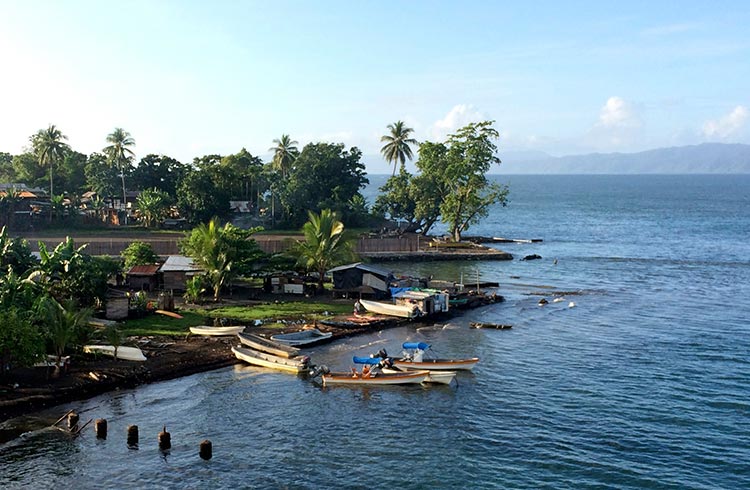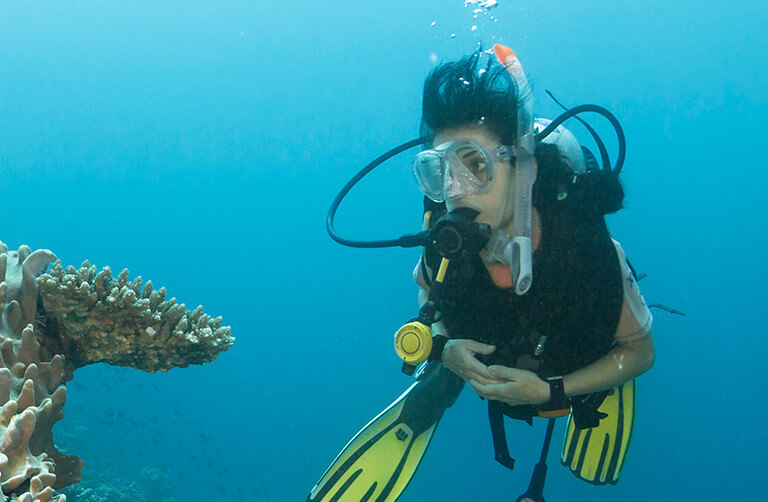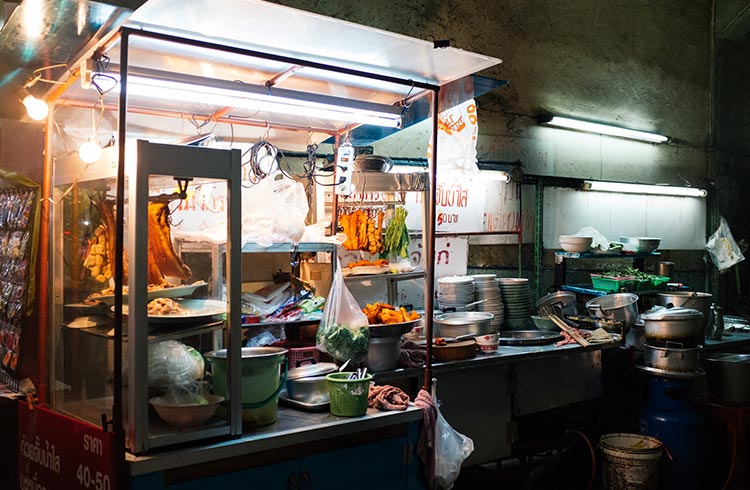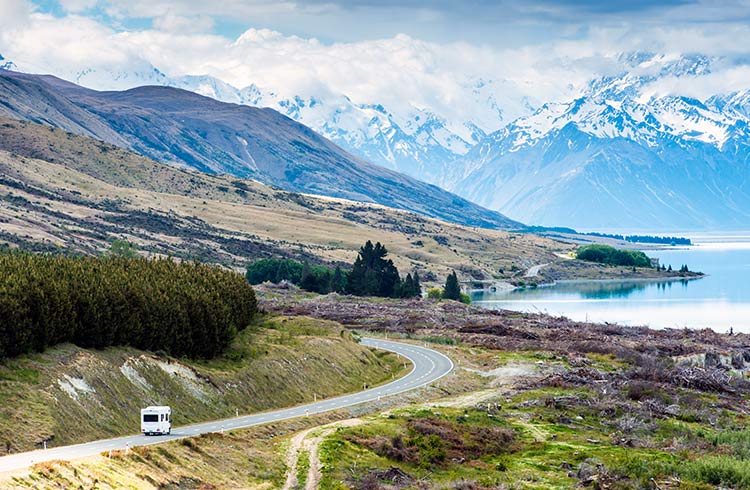8 Things I Wish I Knew Before Visiting Papua New Guinea
Is Papua New Guinea safe to visit? Here's everything to know before you go, from avoiding trespassing on private land to personal hygiene and speaking Pidgin.
 Photo © Getty Images/LifeOfRileyDesign
Photo © Getty Images/LifeOfRileyDesign
With more than 700 languages, a mixture of unique cultures, challenging treks, and great surf, PNG really is the final frontier of travel. Wrecks from World War II lure experienced divers from around the world, and very few countries can compete with the overwhelming hospitality of Papua New Guineans.
Traveling here can also be dangerous. The warrior mentality hasn't been dulled by 60 years of Western influence, and violent crime is a problem in large cities and parts of the Highlands. Here are some tips before you visit Papua New Guinea.
- Know where to go
- Get a guide
- Watch your wallet
- Carry hand sanitizer
- Learn some Pidgin
- Don't be afraid to ask for help
- PNG transport
- Be alert
1. Know where to go
In PNG there's no such thing as public land. Every inch of space belongs to the people: to Papuan tribes or families. If you go exploring on your own, you might trespass on someone's land and create an ugly situation.
Make sure you know where you're going. Ask where you should and shouldn't go. Better yet, have a local go with you.
2. Get a guide
The people of PNG respect associations. You could be seen as a strange intruder or a trusted guest, depending on who you're with. A local guide will help you make a good impression when you arrive at remote tribal villages, and they will detect subtle signs of danger, steering you to safety.
3. Watch your wallet
Armed robbery is rare in PNG, but pick-pocketing and other opportunistic crimes do happen, especially at local markets. Don't make your wallet an easy grab, hide your belongings well, and don't carry excessive amounts of cash or your passport when it's not required. Keep it safe back at your accommodation.
4. Carry hand sanitizer
Personal hygiene in PNG is not exactly up to Western standards. Avoid food-borne illnesses and other health issues by washing hands well and using hand sanitizer regularly.

5. Learn some Pidgin
Even though the language of the media, government, and business is English, fewer than 20% of the population went to school to learn it. If you want to communicate within Papua New Guinea, which boasts more than 700 languages and hundreds of tribes, the best way is through Tok Pisin (aka Pidgin), a kind of broken English.
You'll get extra respect from local adults and make children frenzied with laughter.
6. Don't be afraid to ask for help
You can't possibly be fully prepared for PNG. With limited tourism infrastructure, very few regions in Papua New Guinea are connected by roads. With limited information online and no tourist information offices in Port Moresby, the best way to ask for advice while traveling is to chat with a local – or, have a local guide with you to show you around. Don't be shy to ask for suggestions, or for a helping hand.
7. Papua New Guinea transport
Getting around Papua New Guinea is a challenge. Flying is the best method of transport, and there are a number of domestic airlines that serve provincial capitals and regional towns, making it easy to get to remote places. If you have booked a packaged tour, flights should be included. Independent travelers should book in advance to get the best price on domestic flights.
Using the much cheaper option, Public Motor Vehicles (PMV), to get around is a great way to see the country via the roads. These are privately owned minivans, trucks or buses. (Note: the official PNG tourism site advises women against traveling alone on PMVs.)
Book a scuba diving or snorkeling tour to see the incredible dive sites, reefs, and marine life off the coast of PNG. When traveling by boat, be aware that pirates are known to operate off the coast, so stay up to date with the news or check with your tour guide for the latest information.
8. Be alert
If something doesn't feel right, trust your gut. If someone makes an unusual offer, say thank you (politely) and walk away.
About the Author
Roberto Rocha traded a job in technology journalism to a one-year world trip, surrounding himself with fruits and nuts instead of Apples. He's originally from Brazil but has settled in Montreal, Canada, where, miraculously, he still prefers soccer over hockey. He lives and travels with his girlfriend Bianca.
Related articles
Simple and flexible travel insurance
You can buy at home or while traveling, and claim online from anywhere in the world. With 150+ adventure activities covered and 24/7 emergency assistance.
Get a quote


17 Comments
'Travelers might pick up on the smell of body odour or notice that locals do not wash their hands regularly'.
Jesus Christ, this article... Roberto, anyone with your disgusting superior Western outlook doesn't belong anywhere near PNG. Also, your pitifully reductive article contains several inaccuracies and generalisations. And it's spelled 'raskols', not 'razkols' and they are only a problem in the big cities, such as Moresby and Lae, and usually in select suburbs. At this point, I'm wondering if you've actually ever set foot in PNG.
You are a classic example of the kind of lazy Orientalist f*ckwit the Pacific could do without. Stay away. PS, those adults and kids weren't laughing with you, they were laughing AT you. ;)
I am a 'foreigner' who lived in many areas within PNG for around 9 years.
Roberto pretty much gets it right apart from a spelling mistake. And some areas of PNG have great hygiene, while in other areas it can be lacking. Yes in a hot humid country, if you mingle closely in confined spaces there may be some less than pleasant odours.... but I wouldn't 'right the whole place off about that'.
Other than the disputed part of the Article, the rest of the article is pretty much correct. PNG is an awesome place, the average person / citizen are friendly and willing to talk or share their stories.... if you make the effort. Do be aware of the 'raskols', they are there. DON'T BE A MUG, OR LOOK LIKE A POTENTIAL VICTIM. When exploring, don't wear your best clothes, or flash your comparative wealth..... The culture is different from western countries, so please follow the way that locals do things. A little respect gets you a long way!! The people, the scenery and history are great. (PS: IN the main centres, 25 to 60% can talk enough simple english language....... out in the more remote places English literacy plummets sharply..... but there always seems to be someone around who can translate between "ones attempt at crappy 'tok pisin'" and their best attempt at figuring out what you are talking about. Also don't talk too slow as though everyone is dumb.... you will be surprised with some people who are fluent in English and can often speak several of the PNG languages fluently. Never assume anything would be my best advice !!
'Bee' clearly needs some psychological help if he/she thinks their racist comment is remotely worth consideration.
Bee you sound like a horrible human there - mate
There seem to always be comments from people who consider themselves so progressive and "enlightened" that they instantly have to attack any negative remarks and observations others may have made. The writer is stating facts and facts are not always nice and "politically correct". If the same things were said about countries in the more affluent western world these progressives would not blink an eye. I actually do want to know about the good, the bad and the ugly and that is why I seek to read articles and opinions such as this one before I go so that I am aware and prepared to some extent. I am looking forward to a trip to PNG having known a colleague and his PNG wife who are good friends. She was very forthcoming with less complimentary assessments and advice for travelers going to PNG. Another friend of my mother's who went to teach there was ambushed by locals and almost raped and shot. The group was saved by one of the escorts who knew one of the men in the group and let them go. If anyone wants to sugarcoat what one can expect then write fiction and blindside the tourist.
So, he didn’t spell it wrong... he is from Brazil and lives in Canada. Brazilians usually learn USA English and that is how they would spell it.
It annoys me in North America that when I spell everything with an S instead of Z that I am corrected for my spelling mistake. Different part of the world, different spelling,
But it is NOT WRONG. I purposely refuse to spell things with a Z in North America because I’m an Aussie and thats not how I write English!
@Gordana Vujanovic it´s because some people have prejudices and as soon some words reach their mind they get sort of "triggered". As they say "the eye sees only what the mind is prepared to comprehend". So yeah. Anyways i recommend the series "goldrush" with parker Schnabel if you're into those gold things.
Having lived and worked in Moresby and Lae for a decade, the author is 90% correct. Ascociation is key, if you make some key PNG National friends to escort you, it can be a very safe place to live with good nightlife and some great restaurants.
Here are some extra tips -
Wear shoes in the shower. The hotel staff use the showers and let their relatives use them. Full shoes, not thongs.
Run disinfectant through the washing machine before you put your clothes in for a cycle, same reason as above.
Give the compound guard a 10 kina tip each week to watch out for you and your guests. That 500 kina a year will make him very loyal and he will make sure you are safe.
When having sex with Nationals, long shower and wash first, inspect for obvious diseases, always use protection. They are great fun.
Hooe that helps.
Bottled water only.
Thank you for your useful information some one recommended a job opportunity in new Papua guinea appreciate if you can introduce me some one that can give me more information about living there and keep contact with me
Best Regard
Hey... you probably should get this right. Armed robbery is a thing! You can be in your car an be robbed at a traffic light, but just keep your windows up, your doors locked and be aware! You'll be fine!
Your things will "go walk about" if you don't have a good sense of your surroundings. Meaning, if people are able to walk by freely (i.e. mall food court) you have a higher chance of things being snatched compared to a controlled entrance/exit in a restaurant. There have been instances where restaurants have been held up, but this has not been too common in recent years.
With the raskols (or however you spell it), I've never really encountered this. But have been followed walking along Ela beach and by the water.
Pay attention to "mango season" which is the end of the year just before Christmas. Robberies increase this time of year.
Try to go to a bank machine in an building where you can't be seen from outside. Then, make sure you aren't being followed after using the machine.
DEFINITELY AVOID PMVs and TAXIs!
Just keep your wits about and you'll enjoy this beautiful country!
I loved Roberto's write up but is from one man's perspective, it seems to be shared by few.
I'd love to hear more from Bee about their experiences hear Bee's perspective shared. There may be a side to PNG that others have not seen.
Bee seems to have a warm emotional connection to PNG and seemed to be writing to defend PNG or their people based on Bee's personal experiences.
I would love to read a more comprehensive guide from Bee's perspective.
I have personally "lived like a local" in Philippines, sleeping on a hard concrete floor in a squatter area of Manila, perhaps a place many Westerners might fear to enter. As long as there isn't a riot brewing, in the right company you could probably go anywhere, and if you are prepared to really lower your living standards from what you might be accustomed to in 1st world countries, the reward will be you get to associate with some of the kindest and most hospitable people in the world, and live with them for the price of providing them with food and helping them out with their expenses.
I had to sleep on a floor (probably like most of our worlds 7 billion people) but I wasn't sleeping alone, I had access to clean water and clean enough sanitation, fresh healthy food, I fed the household and lived there rent free for about $5 a day excluding traveling.
I was accompanied 24 hours a day by someone who knew how to get around, spoke the local language and ensured I paid a fair (local) price for everything.
It sounds like Bee may have had similar experiences in PNG I would love to hear about.
Thank you very much for the article and all the interesting comments.
I have read also that for women only can be particularly dangerous. Any woman solo traveling or, better, living there wants to share her experience? Thanks
I lived in the most beautiful place in the world for just over 12 years. I survived the largest guria (earthquake) in Madang in 1970. The people all over Papua New Guinea when I lived there were very friendly and being blond they always wanted to touch my hair equally I asked if I could touch there hair too. They taught me to speak Pisin. The natives used to rub coconut oil into their skin so their skin would be soft and not dried out. Broken coconut dried on the wharf was just delicious to pick up and eat similar to roasted coconut but better.
If you are female and do not want attention if someone tries to touch you. You just shout the word Ulap! Or if someone says to you. ‘U lik quarpim mi’. Shout again Ulap! Which basically means Get Lost!
The worse thing you can catch is grilli and Malaria. If I could take my family there to live, I would but it has become more dangerous since Independence. I love PNG!
I find most travellers on this comment section to be only too willing to share their virtuous stories about hard they have lived in other countries. Some people love going to impoverished countries and live like a local for usually short periods even if they have lived in PNG for nine years they know that if the shit hits the fan they can always go back to their western countries or mail their parents for some more cash.! At the end of the day it's all about one-upmanship. I'm glad I don't travel now as I got sick of people talking about the latest war-zone the've been too. Sorry I don't suffer fools gladly.
I am an Italian woman and I've been living in Papua New Guinea, in New Ireland, for some months over the past few years. New Ireland is safe, and I travelled alone on PMVs but of course I am well known in the region and have plenty of friends in the villages along the road, so I am safe. Even I though always make sure people know where I am, and generally avoid PMVs with all-male passengers. An occasional tourist may not be ssfe, so I also advise always having a local guide or a male companion. Other regions of PNG are much more dangerous, true.
Tok Pisin is NOT broken English, how do you even come to this idea? Is like saying that Italian is broken Spanish. Tok Pisin is an English-lexified creole with its own complex and beautiful grammar. (I am a linguist specialising in indigenous languages of New Ireland and I speak Tok Pisin, too)
This was interesting. We lived there and have been going back and forth since 1994 from USA. So funny to read comments. Some people (Bee) are just negative and can’t help it. I will say it really is so true and depends on the area of PNG. It’s a unique place and has different experiences depending on where you are. I believe it’s over 800 languages, but no judgement here since the census is …maybe not so accurate. Every country in the world has the good and the ugly. It’s okay to speak the truth. PNG has the most hospitable people I know! They also have unorganized corruption from opportunists! I can tell you that I was more worried for my boys than my daughter. So it is dangerous if you don’t know or are not lead by a National. But I found this article pretty accurate!
Png is very beautiful in places, especially the outer islands , New Ireland, Old Rabaul,Manus etc even Lae is pretty but be warned not a place to take lightly. Many people have very little and want what you have. Murder and rape can be common place there amongst the local population and expat will stand out like a sore thumb.Not a place for a naive back packer. Resident 1970 to 1985.